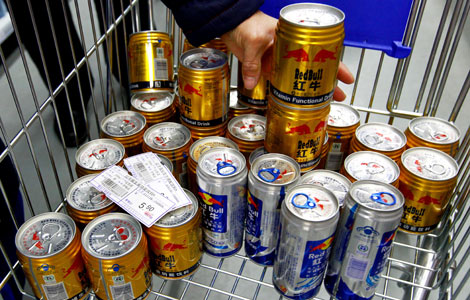Stores pulling Red Bull on health fears
Updated: 2012-02-13 08:06
By Zhou Wenting (China Daily)
|
||||||||
|
 Red Bull energy drinks are removed from the shelf in a supermarket in Shanghai on Saturday. Sales of the drink were suspended by many retailers in China after media reports said that it contained unapproved ingredients. [Pei Xin / Xinhua] |
SHANGHAI - Many supermarket chains around the country have stopped selling Red Bull products in reaction to concerns that the energy beverage might contain unauthorized additives, even though the manufacturer insisted that its product was safe.
The moves follow media reports in Harbin, Heilongjiang province, that claim some ingredients in the drink have not been registered with the State Food and Drug Administration and are not approved for vitamin drinks.
"We took all the beverages from this brand off the shelf on Saturday out of safety concerns, even though the reports gave conflicting answers as to whether the drink was safe or not," said a store manager surnamed Sun at City Shop in Shanghai's Huangpu district on Sunday.
"We will consider returning the goods to the supplier, or putting them back on the shelf, if the quality watchdog says they are safe," he said.
A woman surnamed Shi in the customer service department of the Furong outlet of Carrefour in Changsha, capital of Hunan province, also said that sales of Red Bull products had been suspended after a weekend order by the chain's city headquarters.
Some major stores in Guangzhou and Beijing also told reporters that they had temporarily suspended sales.
The company posted a statement on its official website on Saturday, saying all of its functional beverages were safe and produced in line with national laws and standards.
Functional beverages are a category of drinks that includes sports and nutrition beverages.
The company also uploaded an announcement from the National Food Quality Supervision and Inspection Center.
"Long-term regular and unscheduled sample checks showed that Red Bull products are in accordance with the standards it has claimed, and have never been found to contain unregistered substances," reads the announcement dated Saturday.
The Harbin food and drug administration on Saturday put a statement on its website, which said that Red Bull beverages were approved as a health food by the Ministry of Health in 1997.
The statement said that government records show that sodium benzoate, sodium citrate, carmine pigment and tartrazine - which are said to have been listed among the food additives on the product bottles, though they are not registered with government agencies - are included in its ingredients.
But records on the website of the State Food and Drug Administration did not provide the same information. None of the four additives are listed among the primary ingredients of the beverage, a China Daily reporter found.
Regardless of whether these substances are registered, food experts said some might have been abused.
"The use of sodium benzoate in the product, a beverage for special purposes, doesn't meet the requirements for using food additives," said Yu Yuqin, a senior engineer from a Shanghai food industry institute.
The national standards for food additives implemented in 2011 indicate that the preservative can be used - in limited amounts - in tea, coffee and herbal drinks. Vitamin drinks are excluded.
Some other additives listed on the product's bottles might also be misused.
Sodium citrate is only allowed in baby formula and infant food supplements as an acidity regulator, and caffeine is only permitted in cola-type carbonated drinks, according to the standards.
People with cardiovascular diseases must be cautious about caffeine, which is a stimulant, said doctors.
"Long-term intake will affect kidney functions and calcium retention," said Gu Zhongyi, a dietitian at the Beijing Friendship Hospital.
Chen Xu, a 27-year-old Shanghai resident, said he was surprised that a product launched 15 years ago had been faulty for so long.
"I think government watchdogs should have guarded the pass. Now they must put the products under scrutiny, and give a clear answer to the public," he said.
China Daily

 Relief reaches isolated village
Relief reaches isolated village
 Rainfall poses new threats to quake-hit region
Rainfall poses new threats to quake-hit region
 Funerals begin for Boston bombing victims
Funerals begin for Boston bombing victims
 Quake takeaway from China's Air Force
Quake takeaway from China's Air Force
 Obama celebrates young inventors at science fair
Obama celebrates young inventors at science fair
 Earth Day marked around the world
Earth Day marked around the world
 Volunteer team helping students find sense of normalcy
Volunteer team helping students find sense of normalcy
 Ethnic groups quick to join rescue efforts
Ethnic groups quick to join rescue efforts
Most Viewed
Editor's Picks

|

|

|

|

|

|
Today's Top News
Health new priority for quake zone
Xi meets US top military officer
Japan's boats driven out of Diaoyu
China mulls online shopping legislation
Bird flu death toll rises to 22
Putin appoints new ambassador to China
Japanese ships blocked from Diaoyu Islands
Inspired by Guan, more Chinese pick up golf
US Weekly

|

|






